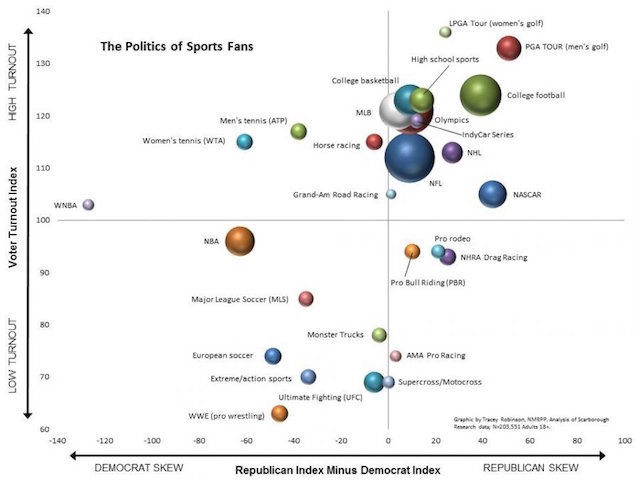The recent mass layoffs at ESPN has re-ignited a contentious debate on just how much politics has led to the downfall of the formerly “Worldwide Leader in Sports.” What’s not debatable, however, is ESPN’s continued left-ward lurch.
And ESPN just made another decision that will do nothing to halt or even slow its financial troubles. It’s doubling down on the NBA, a league that will prove to be fool’s gold.
In 2013, Mike Shannon and Will Feltus from Scarborough Research published a piece in the National Journal on “The Politics of Sports Fans.” While the link is no longer active, the research’s attendant graphic (see above) has been cited by many publications (see here, and here). It painted a pretty good picture of where sports fans stood in terms of their politics, and four years later, there is little reason to believe that has changed substantially.
What’s easy to gather from the report is that most sports fans are slightly right of center (for obvious reasons, but that’s a story for another day). Golf fans are the most right-wing and politically engaged. And the NBA is so far off to the left that the only sport — pro or college, big or small — that’s more lefty is its heavily-subsidized sister league WNBA.
If anything, the NBA is probably even more left-wing today, both the league and its fans, than it was in 2013. The research was published before NBA commissioner Adam Silver booted then-Los Angeles Clippers owner Donald Sterling for using racist language in a private conversation and the onslaught of anti-President Trump sentiments expressed by its owners, management, and players throughout the 2016 presidential campaign and afterward.
LeBron James and Steph Curry, inarguably the NBA’s two biggest star players, have been unabashedly anti-Trump — the former actively campaigned for Hillary Clinton and the latter referred to the president as an “ass.” But their rhetoric was mild when compared to what was spewed by the league’s top two coaches, Gregg Popovich of the San Antonio Spurs and Steve Kerr of the Golden State Warriors. Popovich said he was “sick to my stomach” about the election while Kerr lamented that “we’re better than this” after Trump’s upset victory in November.
Then there’s Dallas Mavericks owner Mark Cuban, whose over-the-top anti-Trump blasts are well-documented.
With its employees and fans so decidedly leftist, the NBA has a numbers problem. Again, as expressed in the above graphic, the healthiest business strategy for any pro league should be to position itself as close to the political center as possible, thus maximizing its ability to attract fans from all walks of life.
The NBA and its broadcast partners, TNT and particularly ESPN, seemed to have missed the memo on this. The false belief that embracing the millennials and their progressive politics would pay off in the long run is as misguided as the John Judis prediction in 2002 that “demography is destiny” as he prophesized a “permanent Democratic majority.”
That strategy is fatally flawed because it makes several false assumptions, including 1) the notoriously mercurial millennials will remain interested in your product for more than five minutes, 2) the young will retain the politics of their youth as they go through life’s trials and tribulations, and most importantly, 3) your older, loyal clientele, who isn’t ready to die for another 30-40 years, will not abandon you even as you take it for granted.
And the numbers don’t lie about this. In 2016-17, the first year of the new, massive, nine-year, $24 billion deal, TV ratings on ESPN and TNT were down 5 percent and 8 percent, respectively. There’s more trouble in local markets, where NBA telecast ratings were down double digits in 15 markets with an overall decline of 14 percent across its 30 markets.
While the NFL can trot out political fatigue to explain away some of the ratings decline during its 2016 season, that excuse simply does not apply to the NBA, whose season started just two weeks before the November 8 election.
ESPN president John Skipper, who signed the deal to pay the NBA $1.4 billion per season for the network’s package (compared to $500 million previously), had a desperate decision to make as he scuttled more than 100 on-camera and/or frontline employees. He opted to go all in on his NBA investment.
While ESPN basically eliminated its NHL department, gutted its baseball coverage, and even substantially trimmed its NFL and college football personnel, it chose to dump more money on the NBA. Though it let go several veteran NBA writers, ESPN acquired Adrian Wojnarowski and his crew at The Vertical from Yahoo! Sports. There is no other way to read this: ESPN is committed to the NBA, and everything else can pretty much go to rot.
Whether this move is going to put ESPN back to profitability remains to be seen (don’t bet on it), but there is the unmistakable whiff of ESPN and its parent company Disney’s commitment to a politically leftward lurch.
If only they remembered this pearl of wisdom from an NBA icon who steadfastly refused to wade into politics: “Republicans buy sneakers, too.”
Follow Samuel Chi on Twitter @ThePlayoffGuru.

COMMENTS
Please let us know if you're having issues with commenting.